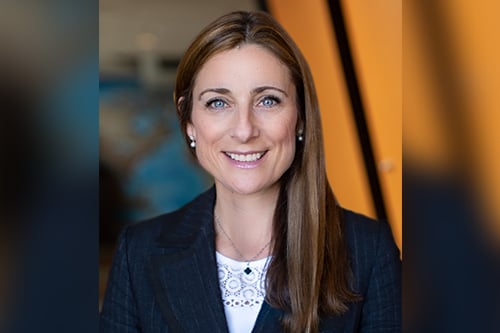

Responding to the COVID-19 pandemic has brought out the best in many businesses. For some, this was displayed by the speed with which they managed to adapt to remote working. For some, it was showcased by the employee wellbeing initiatives they implemented to protect their staff and, for others, by the impressive customer satisfaction statistics generated despite the crisis. However, one standard shared by each successful organisation has been the leadership displayed at every level of the business in the face of such uncertainty.
Speaking with Insurance Business, Jane Pocock (pictured), the MD of Copart UK, paid warm tribute to her team for the strength and adaptability they have displayed throughout the crisis. At the very beginning of the lockdown, she said, Copart received a letter from the PRA and the FCA to confirm their status as essential workers and the business has been working through the pandemic ever since.
“Because of what we do in the claims process and because we had to continue the sale of cars so that policyholders would not be out of pocket due to the pandemic, we have kept on operating,” she said. “And this has meant developing COVID safety protocols for our drivers and within our operation centres. And we’re fortunate as, due to the sheer scale of these centres, we’ve been able to put in one-way systems, and most of our people are out and about working outside anyway. So we’ve adapted our rest areas and our office space to ensure that people are not crowded in any way.”
Examining the attributes which enabled the team to embrace these changes to the way they work, she noted that she and her colleagues share very robust operational backgrounds. Pocock, who joined the business in early 2019, brings a wealth of experience to her role with a career that spans over 25 years in the automotive industry and includes leadership roles at Vans Direct and The AA.
“If I was to single out traits that [the Copart team] share,” she said, “we are very calm and very determined. In the beginning, we sat back, and we created our own Cobra team and tried to make light of our situation whenever we could because we knew we were going to be working 24/7 through the crisis. So, we asked ‘what does the government do?’.
“So we created the Copart Cobra room where one member from every significant department sat down to discuss how we should communicate with everybody both internally and externally, as we do a lot of external communication, from the Environment Agency to local councils to unions to MPs.”
In addition, Copart communicated widely with its internal people. This meant letting all employees know the processes that have been put in place to protect and support them, especially vulnerable people with pre-existing illnesses who needed to be shielded.
“We have created herds for want of a better word,” she said. “So, everyone was just coming to work or going home which meant that the risk of contamination was kept to an absolute minimum… We’re lucky that we’ve always been quite a technology-led company so we were easily able to initiate homeworking. And we’ve still got many of our office-based claims handlers happily working from home.”
Read more: How to strengthen your leadership team
The way that Copart has managed to navigate the pandemic and prove its capacity to be there for its partners is likely to have long-term implications on how these partners view the business. Pocock noted that the number one thing that Copart prides itself on is the collaboration it has with its insurance partners and it is dedicated to continuing that. These businesses have had their own operational models challenged recently, she said, and the way they have worked together with Copart and the camaraderie that has developed has been amazing.
“We already knew each other prior to this, but the depths of our relationships are now incredibly strong,” she said. “I’ve received some fantastic letters and emails from insurance companies to say ‘thank you’ and to say they won’t forget how well we’ve worked together. And some of our competitors have had to close because their business structure is quite fragmented, so we are a survivor and that has been noticed, and we have attracted new business… So there have been positives that we’ve taken out of this, especially how the depths of our [insurance partner] relationships have been solidified.”
